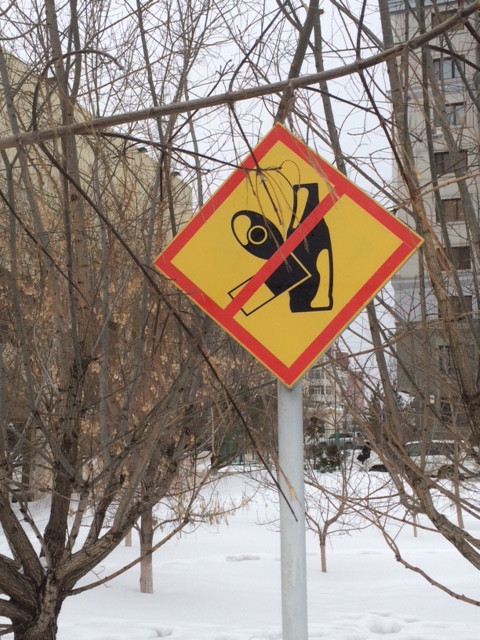So, in the past two weeks I have spent a week in chilly Kazakhstan (Astana) where the road-signs are rather difficult to fathom. Does this mean that public drinking while ten-pin bowling and carrying a primitive smartphone is banned?
If it isn’t, it should be.
In Astana I gave two courses on Public Speaking and Speechwriting. The main problem I faced was that Kazakh officials just don’t think like me.
Some might say that that is all to their credit, and they may be right. But it proves to be very hard to explain the idea that in a speech it is OK to take an abstract idea (such as the contrast between Values and Order) and build a speech round that. Instead the tendency is to take a very mechanical approach to public speaking: define the issues, give examples, sum up. Zzzzzzzz.
The speech is not about communicating, in fact. It’s about expressing an attitude of authority and control.
Still, a splendid time was had by all exploring these mysteries, and watching officials give short speeches written by their colleagues. We started on Day One with a rather defiant defence of Kazakhstan’s oratorical traditions. We ended on Day Three with vigorous complaints when a speech was too boring and had had no human resonance. #Progress
Then down to Kosovo and its hard-working new Diplomatic Academy. In Prizren a lot of time is spent wearing dark clothes and arguing intently over small cups of coffee:
And wall murals advertising coffee go to places we do not usually see here in the UK:
Here the public speaking challenge for senior officials is very different: how to market a newly independent country when it has little money and not too many positive things are happening? Indeed, bad things are happening. People are leaving in droves.
Is there a sinister conspiracy by various world powers against Kosovo making this happen? Hmm. Let me think about that carefully…
No.
It’s galloping frustration at the inability of the Kosovo political elites to set up a system not dominated by patronage and nepotism. I heard vivid examples of well educated Kosovans applying for jobs or even having jobs and seeing unqualified people brought in over their heads for someone’s ‘family’ reasons. Plus it’s perhaps hard to persuade even risky-loving investors to come to a place where there is so little sense of pride in public spaces and rubbish lies everywhere. How has that been allowed to happen by the successive expensive international presences having so much influence over Kosovo? Beats me.
Finally, back home again I have been continuing my series of webinars on Drafting Talking-Points for the excellent United Nations System Staff College in Turin. Over 20 UN officials round the world have been listening to my thoughts on this subject and doing various exercises.
The UN family has specific public speaking problems. Its speeches at all levels default towards development-speak jargon and clunky platitudes:
There is however increasing realization that more has to be done to ensure that these vulnerable populations build sufficient capacity not only to cope, with shocks, but recover and even improve on their livelihoods. A lot of effort is already being put in this area by government, civil society and the UN but the emphasis is on coordinating better and building better linkages among the different interventions…
We can all agree that firstly all stakeholders must engage in a coherent and coordinated manner in addressing the root causes of the crises in order to achieve incremental transformational impacts (sic). This project is an example of that ambition, and how the UN will continue to support resilience-building efforts throughout the country.
We believe that our efforts should not only aim at meeting the immediate needs of the communities affected by crises but also address the factors that trigger them. Our proposed approach to building resilience therefore dwells on the need to address both immediate shocks and emerging stresses whilst concentrating on building the adaptive capacities of communities, households and institutions to manage recurring crises.
Imagine listening to that. What does it say, other than that expensive international groupings will spend a lot of money on analysing being expensive and ‘coordinating’ themselves better (sic)?
Wait. There’s more?
What are the next steps?
There have been various discussions and consultations with government both at the national and at the local level to agree on different aspects of this project. With the launch the project will be moving into the next phase which will entail: refinement of Village Action Plans and project activities, baseline data collection, training for implementing partners and development of a communication strategy.
This sort of thing substitutes abstract faux management-speak for action and insight. Nothing more alienating can be said in a talk at a school in a poor part of Africa?
My modest webinars are trying to shift that a bit. With some success, it must be said. Some of the examples being produced are not only stunningly better. They are good by any standards. I hope to share with you in due course one example of a success that has already been achieved this week. Watch this space.
In short, I’ve been running around a lot. And after the Budapest Russia/Ukraine debate next week I have to go to Paris and then to UNSSC in Turin for a ‘live’ course to UN future leaders. How one earns a living.














The UN speech speak would force me to gnaw my ears off.